The Supreme Court allowed an appeal and set aside the Karnataka High Court’s judgment, upholding the Trial Court’s dismissal of a partition suit. The division bench comprising Justice Sandeep Mehta and Justice Joymalya Bagchi held that the sale of Hindu Undivided Family property by the Karta to meet expenses of his daughter’s marriage constituted legal necessity, making the purchaser a bona fide buyer for valuable consideration.
The plaintiff-appellant alleged that the suit land, belonging to the HUF, had been mismanaged due to the karta’s addiction to alcohol and bad habits, and that various parcels had been sold for meagre consideration. The plaintiff further alleged that the karta colluded with the other defendants to execute a sale deed of the suit land on 26.07.1995 without consideration or family necessity.
The defendant contended that the suit land had been sold for valuable consideration, receiving Rs. 1,00,000 on 18.06.1994 when an agreement for sale was executed. It was claimed that the sale was made out of legal necessity due to marriage of his daughter, and that possession of the land was given thereafter, as reflected in the mutation certificate and land revenue records.
The Trial Court held that the suit land was sold on 26.07.1995 to cover the expenses of his daughter’s marriage. The High Court reversed this, holding that the defendant had not produced evidence of legal necessity and that the claim regarding daughter’s marriage was unfounded, as she had been married earlier.
The Supreme Court analyzed the Karta’s power to sell HUF property, citing Beereddy Dasaratharami Reddy v. V. Manjunath, (2021) 19 SCC 263, which recognized that a Karta has wide discretion to act out of legal necessity or for the benefit of the estate, binding all undivided family members. The Court noted that while the daughter’s marriage had occurred in 1991, prior to the sale, it was common knowledge families incur heavy debts to perform marriages of their daughters and such debts have a cascading effect on family finances down the years.
The Court found that the expenses borne by the coparceners in respect of the marriage created financial stress on the family, leading to the sale of the suit land, and that the High Court had overlooked these facts, erroneously finding that the purchaser’s case for sale on the ground of legal necessity was not proved. It was noted that through cross-examination and other evidence, a clear nexus between the sale and the marriage expenses had been established, discharging the onus. Regarding the purchaser’s good faith, the Court observed that the suit land stood in the Karta’s name and relying on such entries, the defendant purchased the land for valuable consideration.
The plaintiff’s delay in challenging the transaction, was criticised by the Court, noting that challenging the sale transaction after five years raises grave doubt regarding his bona fides. It found the plaintiff’s explanation that he was unaware of the sale to be false as ample evidence showed the defendant’s continued possession of the suit land.
The Court concluded that the High Court erred in holding the sale was not for legal necessity and the latter was not a bona fide buyer for valuable consideration and set aside the High Court’s judgment while upholding the Trial Court’s dismissal of the suit.

